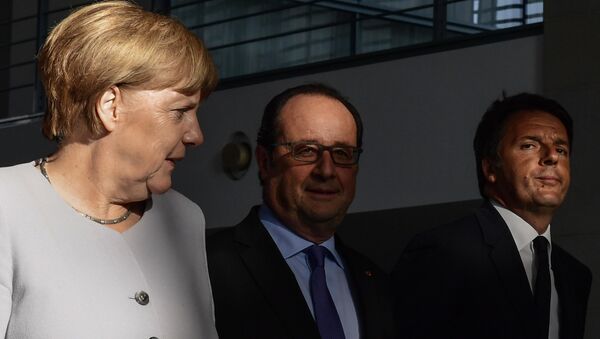In a sign of how the EU could radically change following Britain's departure, Germany and France have drawn up new plans for greater EU military cooperation, including the creation of a new military HQ and more integration with overseas missions.
The plans, reported by German newspaper Sueddeutsche Zeitung and French daily Le Figaro, stated: "in the context of a deteriorating security environment… it is high time to reinforce our solidarity and European defense capabilities in order to more effectively protect the citizens and borders of Europe."
Germany has recently published a white paper suggesting for further EU military cooperation and steps which "could" result in an EU army.
— Young Eurosceptics (@Y_Eurosceptics) July 26, 2016
The issue of greater EU military integration has been a matter of huge tension within the bloc, with the UK vehemently rejecting any suggestions towards the creation of an EU army, arguing that NATO defense structures are sufficient for the bloc's defense.
No one should fear closer EU military cooperation. But it should not be confused for genuine and badly needed European military investment.
— Anthony King (@antbruceking) September 9, 2016
However given the UK is set to leave the bloc, French and German officials have sought to push their own agenda, given the UK is set to lose its say on EU policy
"Taking into account the United Kingdom's decision to leave the EU, we have to henceforth act as 27 [member states]," the French-German plans said.
Finance: A Taxing Issue
Another example of how the EU could radically change in the wake of Brexit is on the issue of tax and financing, with lawmakers from across the bloc discussing the matter of budget reform and the possible introduction of an EU-wide tax system.
Last week members of EU national parliaments, MEPs and other EU officials met to discuss the key issues at the inter-institutional conference on the future financing of the EU — an event at which British representation was absent.
In 2015 the UK paid £13 billion to the EU budget, and EU spending on the UK was £4.5 billion. So UK’s ‘net contribution’ was £8.5 billion.
— Sarah Jane (@sarahdukip) September 8, 2016
With concerns over the reasonably small EU budget, which is made up of member state contributions, talks were held about reforming the system, something that was previously vetoed by the UK as a result of London's preference for a minimal EU budget.
Talks were also held over the sensitive topic of reforming the EU tax system and introducing a union-wide tax to help provide funds for Brussels, with many countries rejecting such an approach, arguing that member state should hold their own fiscal sovereignty.
The Irish government doesn't want the #AppleTax and it's also opposed to an EU-wide corporate tax system. More for #Apples $250bn stockpile.
— Aidan Regan (@Aidan_Regan) August 30, 2016
However some officials noted that with the UK — often seen as the biggest opponent to greater EU integration — set to leave the bloc, opportunities to reform the EU have become more realistic.
"Ironically, Brexit has forced us to find an answer," veteran French MEP Alain Lamassoure told Euractiv, who noted the Thatcher negotiated British budget rebate "was the reason for the malfunctioning of the current system."
EU's Post-Brexit Future
With the UK government still undecided on what Brexit approach the country will take, discussions on defense, EU budgets and tax systems have demonstrated the bloc's willingness to try and shape the future of the union without London's influence.
The recent developments have echoed the concerns of 'Remain' campaigners in Britain, who argued that leaving the bloc would mean that Britain would still have to abide by EU rules, but would have no seat at the table when discussing and deciding policies.
The UK's fast-declining influence in today's global world couldn't be more clearly demonstrated.#EUnited pic.twitter.com/G9DUyHKTPL
— KimInBru.EU (@KimBru49) September 6, 2016
Now there are fears in London that Britain's opposition to greater EU military and financial cooperation could be pushed aside by member states that have called for greater integration.
With UK Prime Minister Theresa May currently facing pressure from some of her own ministers to make a 'hard Brexit' from the bloc, some lawmakers across the continent are strengthening the case for the creation of a radically different EU in the post-Brexit future — free from British objections.




